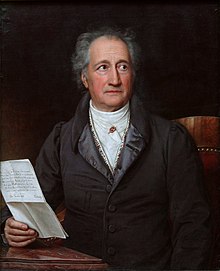 Global Information
Global InformationJohann Wolfgang von Goethe information
Geheimrat Johann Wolfgang von Goethe | |
|---|---|
 Goethe in 1828, by Joseph Karl Stieler | |
| Born | Johann Wolfgang Goethe 28 August 1749 Free Imperial City of Frankfurt, Holy Roman Empire |
| Died | 22 March 1832 (aged 82) Weimar, Grand Duchy of Saxe-Weimar-Eisenach, German Confederation |
| Occupation | Poet, novelist, playwright, natural philosopher, statesman |
| Language | German |
| Education |
|
| Genres |
|
| Literary movement |
|
| Years active | From 1770 |
| Notable works |
|
| Spouse |
Christiane Vulpius
(m. 1806; died 1816) |
| Children | 5 (4 died young), including August von Goethe |
| Parents |
|
| Relatives |
|
| Signature | |
 | |
| Chancellor of the Exchequer of Duchy of Saxe-Weimar | |
| In office 1782–1784 | |
| Superintendent of the ducal library and Chief Adviser of Saxe-Weimar (from 1775) | |
| Commissioner of the War, Mines and Highways Commissions of Saxe-Weimar (from 1779) | |
Johann Wolfgang von Goethe[a] (28 August 1749 – 22 March 1832) was a German polymath and writer, who is widely regarded as the greatest and most influential writer in the German language. His work has had a profound and wide-ranging influence on Western literary, political, and philosophical thought from the late 18th century to the present day.[3][4] Goethe was a German poet, playwright, novelist, scientist, statesman, theatre director, and critic.[3] His works include plays, poetry and aesthetic criticism, as well as treatises on botany, anatomy, and color.
Goethe took up residence in Weimar in November 1775 following the success of his first novel, The Sorrows of Young Werther (1774). He was ennobled by the Duke of Saxe-Weimar, Karl August, in 1782. Goethe was an early participant in the Sturm und Drang literary movement. During his first ten years in Weimar, Goethe became a member of the Duke's privy council (1776–1785), sat on the war and highway commissions, oversaw the reopening of silver mines in nearby Ilmenau, and implemented a series of administrative reforms at the University of Jena. He also contributed to the planning of Weimar's botanical park and the rebuilding of its Ducal Palace.[5][b]
Goethe's first major scientific work, the Metamorphosis of Plants, was published after he returned from a 1788 tour of Italy. In 1791 he was made managing director of the theatre at Weimar, and in 1794 he began a friendship with the dramatist, historian, and philosopher Friedrich Schiller, whose plays he premiered until Schiller's death in 1805. During this period Goethe published his second novel, Wilhelm Meister's Apprenticeship; the verse epic Hermann and Dorothea, and, in 1808, the first part of his most celebrated drama, Faust. His conversations and various shared undertakings throughout the 1790s with Schiller, Johann Gottlieb Fichte, Johann Gottfried Herder, Alexander von Humboldt,[6] Wilhelm von Humboldt, and August and Friedrich Schlegel have come to be collectively termed Weimar Classicism.
The German philosopher Arthur Schopenhauer named Wilhelm Meister's Apprenticeship one of the four greatest novels ever written,[7][c] while the American philosopher and essayist Ralph Waldo Emerson selected Goethe as one of six "representative men" in his work of the same name (along with Plato, Emanuel Swedenborg, Montaigne, Napoleon, and Shakespeare). Goethe's comments and observations form the basis of several biographical works, notably Johann Peter Eckermann's Conversations with Goethe (1836). His poems were set to music by many composers including Mozart, Beethoven, Schubert, Berlioz, Liszt, Wagner, and Mahler.
- ^ "Goethe". Merriam-Webster.com Dictionary.
- ^ a b Wells, John (2008). Longman Pronunciation Dictionary (3rd ed.). Pearson Longman. ISBN 978-1-4058-8118-0.
- ^ a b Nicholas Boyle, Johann Wolfgang von Goethe at the Encyclopædia Britannica.
- ^ "Johann Wolfgang von Goethe — Biography". knarf.english.upenn.edu. Retrieved 3 January 2023.
- ^ a b "Classical Weimar UNESCO Justification". Justification for UNESCO Heritage Cites. UNESCO. Archived from the original on 29 July 2022. Retrieved 7 June 2012.
- ^ Daum, Andreas W. (March 2019). "Social Relations, Shared Practices, and Emotions: Alexander von Humboldt's Excursion into Literary Classicism and the Challenges to Science around 1800". The Journal of Modern History. 91 (1). University of Chicago: 1–37. doi:10.1086/701757. S2CID 151051482. Archived from the original on 17 April 2021. Retrieved 19 February 2021.
- ^ a b Schopenhauer, Arthur (January 2004). "The Art of Literature". The Essays of Arthur Schopenahuer. Archived from the original on 4 May 2015. Retrieved 22 March 2015.
Cite error: There are <ref group=lower-alpha> tags or {{efn}} templates on this page, but the references will not show without a {{reflist|group=lower-alpha}} template or {{notelist}} template (see the help page).